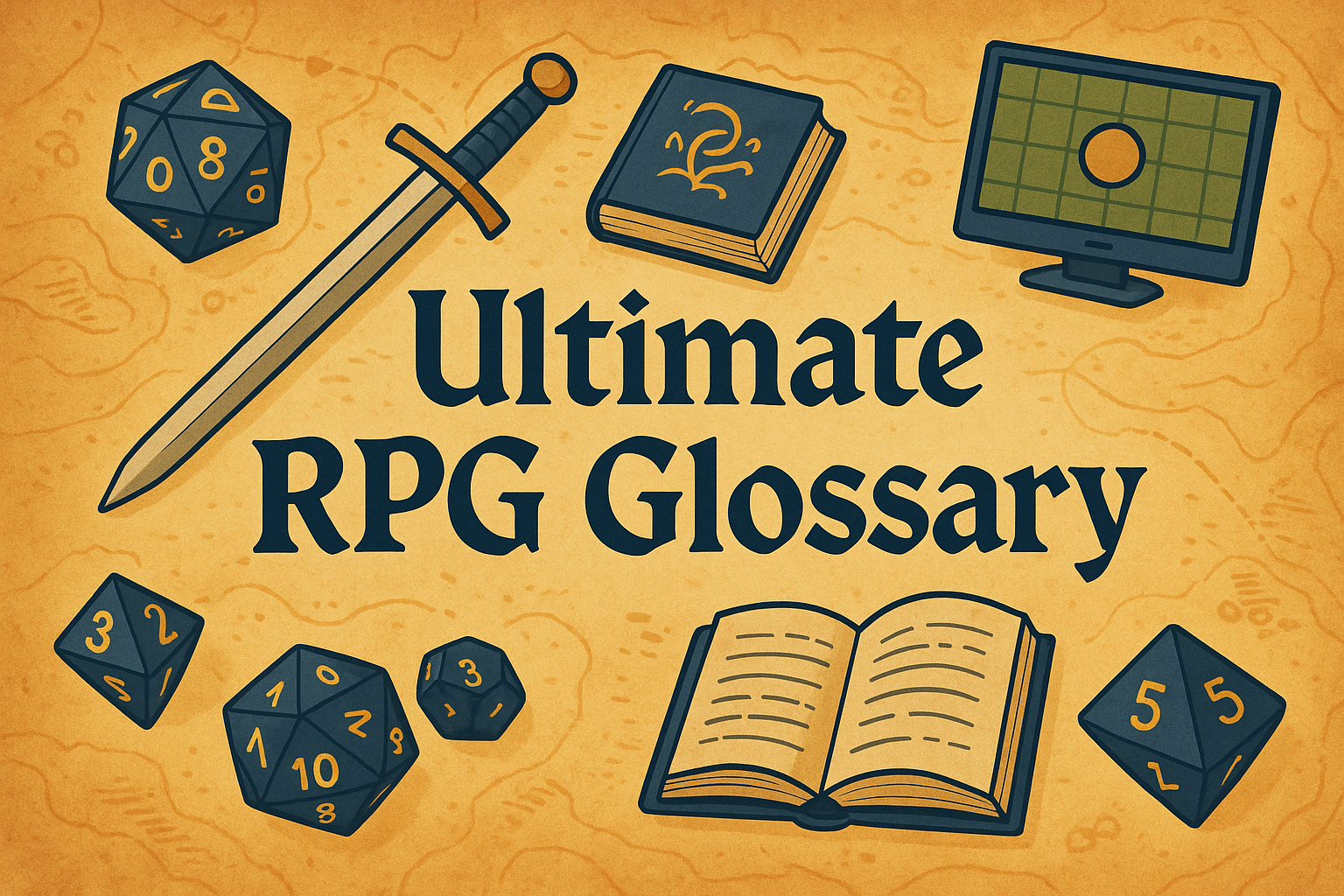Comprehensive RPG Glossary
Comprehensive RPG Glossary
Welcome to the Comprehensive RPG Glossary — a living reference designed to make sense of the language of role-playing games. Whether you’re a new player just picking up your first set of dice, a veteran GM searching for clarity, or a designer brushing up on industry jargon. This glossary aims to be both practical and approachable.
Role-playing games (RPGs) are more than just dice and character sheets. They are a shared storytelling medium with their own evolving vocabulary. Some of these terms have been around since the earliest days of Dungeons & Dragons in the 1970s, while others are products of modern indie design, online play, and digital platforms. Knowing the difference between fluff and crunch, or understanding why railroading is frowned upon, helps you navigate not only the rules but also the culture and etiquette of play.
This glossary collects definitions, short explanations, and direct links to trusted sources like Wikipedia, official SRDs (System Reference Documents), and respected community wikis. Where necessary, I’ve also included fan-coined jargon a.nd modern innovations, from safety tools to virtual tabletops
Think of it as both a dictionary and a guidebook:
- If you’re learning a new system, you can quickly look up unfamiliar mechanics.
- If you’re a GM teaching newcomers, you can share this as a resource.
- If you’re writing, designing, or debating online, you’ll have a neutral reference point.
And because RPGs keep evolving, so will this glossary. It isn’t static — my Aim is that it’s built to grow with the hobby.
Games Haven UK – Roleplaying Games (RPG) Community
A
Ability (Abilities)
Core stats that define a character’s physical, mental, or social traits (e.g., Strength, Dexterity, Charisma). Also called Attributes or Stats.
Wikipedia
Action Points (AP)
A pool of points spent per turn to perform actions, creating tactical flexibility. Common in tactical RPGs.
Wikipedia
Action Resolution
Mechanics by which success or failure is determined (e.g., dice rolls, card draws, comparisons to target numbers).
Wikipedia
Adventure
A single story or scenario, often one “episode” in a broader Campaign.
Wikipedia
Alignment
A character’s ethical/moral outlook (e.g., Lawful Good, Chaotic Evil in D&D).
Wikipedia
AoE (Area of Effect)
An effect (usually magical or explosive) impacting all within a defined space.
RPG StackExchange
AC (Armor Class)
How hard a creature is to hit in D&D-style systems.
Wikipedia: Armor Class
Actual Play
Recordings, streams or write-ups of real game sessions.
Wikipedia: Actual play
Advantages / Disadvantages
Positive and negative character features used in many systems at creation or advancement.
Overview in GURPS
Adventure Seed
A short prompt the GM expands into a full scenario.
AoO / Opportunity Attack
A special reaction attack triggered by certain enemy actions.
B
Battle Mat
A grid or map for visualizing tactical combat, physical or digital.
Wikipedia
Buff
A temporary beneficial effect enhancing stats or performance.
Wikipedia
Bug Hunt
A scenario reduced to repetitive combat with little narrative depth.
Badwrongfun
Snark for “you’re having fun the wrong way”. Shorthand in forum debates.
BBEG / LBEG
Big Bad Evil Guy, and the lesser lieutenant version.
BECMI
Basic, Expert, Companion, Master, Immortal boxed sets of classic D&D.
Wikipedia: D&D Basic Set
Boffer LARP
LARP with padded weapons and physical combat.
Wikipedia: LARP
Breath Weapon
Area attack from creatures like dragons.
Broad vs Narrow Skills
Design shorthand: broad skills cover many actions; narrow skills are specific.
BTB (By The Book)
Playing strictly as written. See also RAW.
BMX Bandit
A competent PC overshadowed by another PC’s build. Comedy-reference slang.
C
Campaign
A long-term series of connected adventures forming a continuous narrative.
Wikipedia
Character Sheet
The record of a character’s stats, gear, and backstory.
Wikipedia
Class
An archetype/profession (Fighter, Wizard, Rogue) defining abilities and playstyle.
Wikipedia
Critical Hit (Crit)
An exceptionally successful attack, usually dealing extra damage.
Wikipedia
Crunch
Rules-heavy mechanics; contrasted with Fluff.
Wikipedia
Crowd Control (CC)
Abilities that limit or disable multiple foes (e.g., stun, charm, paralysis).
Called Shot
Targeting a specific body part or item at increased difficulty.
Caltrops
Nickname for spiky d4s.
Campaign Setting
The world or milieu of play.
Wikipedia: Campaign setting
Canon vs Fanon
Official material vs community-accepted but unofficial material.
Wikipedia: Canon (fiction)
Caster Supremacy / LFQW
Balance issue where casters outscale non-casters.
Wikipedia: Linear fighter, quadratic wizard
CGen
Shorthand for character generation.
Collapsing Die
Opposite of exploding: low roll triggers an extra roll subtracted from the total.
Core Rules
The minimal rules needed to play a system.
Creature
Catch-all for anything that takes turns.
Cross-Class
Using a skill or feature outside your class, often less efficiently.
CRPG
Computer RPGs distinct from tabletop.
D
Damage
Numeric measure of harm inflicted, reducing HP or similar resources.
Wikipedia
Dice Notation (dX)
Expression for rolling dice: XdY means roll X dice with Y sides. Modifiers (+/-) apply.
Wikipedia
Dice Tower
A tool used to randomize dice rolls consistently.
BoardGameGeek
Dungeon Crawl
Exploration-focused adventure with monsters, traps, and treasure.
Wikipedia
Dungeon Master (DM) / Game Master (GM)
The player who runs the game world, controls NPCs, and arbitrates rules.
Wikipedia
d[X] and d100
Dice notation including percentile rolls.
Wikipedia: Dice notation
DC / Difficulty Class
Target number a check must meet or beat.
Decker Problem
A mini-game isolates one player while others wait. Originated from Shadowrun’s “deckers”.
Wikipedia: Shadowrun – Decker
Deus Ex Machina
Outside-the-story rescue resolving a no-win state.
Wikipedia
Dice Training
Superstition about “training” dice by storage or pre-rolling.
Disadvantage
See Advantages/Disadvantages. Also the D&D 5e mechanic paired with Advantage.
D&D Basic Rules
DMG / PHB / MM
Dungeon Master’s Guide, Player’s Handbook, Monster Manual.
DMG | PHB
Dump Stat
A least-valued ability often minimized during creation.
E
Experience Points (XP)
Points awarded for success, allowing advancement.
Wikipedia
Expiration Level
Fan term in D&D about “sweet spots” where certain classes perform best.
Effect / Status Effect
Ongoing condition like poisoned, stunned, frightened.
Wikipedia: Status effect
Exploding Dice
Max result lets you roll again and add.
Expiration Level
Jargon for a class’s “sweet spot” level in 3.x optimization.
Extra / Mook / Goon / Minion
Lightweight NPC meant to be quickly overcome.
F
Feat
Special optional ability granting unique advantages.
Wikipedia
Fate Points
Narrative tokens in the Fate RPG used to shape outcomes.
Fate SRD
Fluff
Narrative details without mechanical impact.
Wikipedia
Freeform
Improvised roleplay with few or no rules.
Fumble
Critical failure result.
Family / Series (site taxonomy)
Geekdo indexing terms for grouping items.
Fanon
See Canon vs Fanon.
Fortune / Karma / Drama (resolution)
Forge-era shorthand: randomizer result, fixed attribute result, or narrative decision.
Frag
To kill something, especially with explosives.
Fudge (GM Fudging)
Secretly altering outcomes behind the screen.
G
Gish
Fan term for a fighter-mage hybrid. Originated in D&D’s Githyanki lore.
Grognard
A veteran RPG player, often preferring old-school play.
Wikipedia
GMPC
A GM-controlled party member. Often discouraged.
RPG.SE explainer
Gamist / Narrativist / Simulationist (GNS)
Creative agenda model.
Wikipedia: GNS theory
Gearhead / Gun Bunny
Player obsessed with kit or firearms detail.
Gestalt
Dual-track advancement combining two classes.
Glass Cannon
High damage, low durability.
GM Fiat
GM ruling overriding or extending written rules.
Grainy
Low granularity rules where distinctions are coarse.
H
Hit Points (HP)
Numerical measure of a character’s survivability.
Wikipedia
House Rule
Custom rule a group adopts to modify official systems.
Wikipedia
Hack
Adapting one system to a new setting or purpose.
Heartbreaker / Fantasy Heartbreaker
Ambitious indie D&D-like unlikely to succeed commercially.
Wikipedia
Hit Location
Rules that track where a blow lands.
Hex Map / Hexcrawl
Hex-gridded maps and exploration style.
I
Initiative
Mechanic for determining combat turn order.
In Character (IC)
Acting and speaking as the character, not the player.
Imploding Die
See Collapsing Die.
Indie RPG
Created and published outside major publishers.
Wikipedia
IP / CP / SP
Improvement, Character, and Skill Points.
K
Knowledges
Lore-based skills common in older D&D editions.
Karma
A meta-currency or spiritual stat in some RPGs (e.g., Shadowrun).
Karma (alt. meaning)
Resolution by comparing fixed attributes rather than rolling.
KTAATTS
“Kill Them All And Take Their Stuff.” OSR-ish shorthand for loot-centric play.
L
Level
Numerical indicator of progress/power.
Wikipedia
Loot
Treasure or rewards gained through play.
LARP / LRP / Chamber LARP
Live play without dice. Chamber LARP is short-form in small spaces.
Wikipedia: LARP
Lasersharking
Stacking too many “cool” ideas into one thing, often silly.
LBB
Little Brown Books (OD&D) or Little Black Books (Traveller).
Lethal vs Subdual (Non-lethal) Damage
Different damage tracks with different effects.
Wikipedia: Non-lethal damage
Level-Based vs Point-Based
Discrete levels vs spendable points for advancement.
Wikipedia: Character level | Character points
Line of Sight / Line of Effect
Can you see it vs can the effect reach it.
Little Hitler
Slang for a domineering player. Use sparingly.
LoE / LoS
Abbreviations for the above.
Lone Wolf
Solo play with one GM and one player.
Lumping / Root-Branch / Skill Tree
Different ways to group or unlock skills.
M
Magic Points (MP) / Mana
Resource spent to cast spells.
Wikipedia
Metagaming
Using out-of-character knowledge to affect in-game choices.
Wikipedia
Miniature
Miniature figures representing characters or monsters.
Wikipedia
Magic(al) Tea Party
Pejorative for heavy GM fiat or undefined abilities.
Mary Sue
Wish-fulfillment, unrealistically perfect character.
Wikipedia
Meat Shield
Colloquial for a tank.
Wikipedia: Tank (gaming)
Mech Pilot
Player focusing on pre-codified action menus instead of in-world choices.
Melee
Close-quarters fighting.
Wikipedia
Metagame
Discussion or choices at the player level rather than the character’s.
Metaplot
Publisher-advanced setting storyline outside the table.
Wikipedia
Min-Maxing
Optimizing strengths while dumping weaknesses.
Wikipedia
Moderator / Referee / Storyteller / Narrator
Other labels for the GM.
Monty Haul
Treasure-heavy play where loot trumps story.
Wikipedia
Munchkin
Power-gamer focused on advantage over narrative.
Wikipedia
Murderhobo
PC who wanders, kills, and loots with minimal ties.
Wikipedia
Murphy’s Rule
Rule that produces odd or unintended outcomes.
Multi-Class / Gestalt / Mutt
Combining classes in one character.
N
Narrativism
Playstyle focused on story and character arcs.
Wikipedia
NPC (Non-Player Character)
Any character run by the GM.
Natural X
Unmodified die result, e.g., natural 1 or natural 20.
Nerfing
Out-of-game rules change that reduces power.
Wikipedia
Narrow Skills
See Broad vs Narrow Skills.
O
One-Shot
A single-session self-contained RPG adventure.
RPG StackExchange
Open Game License (OGL)
License allowing free use of certain RPG content.
Wikipedia
OSR (Old School Renaissance)
Community reviving and remixing early RPG styles.
Wikipedia
OA
See AoO.
Old-School / OSR
Early-edition style or its modern revival.
Wikipedia: OSR
One-Character Game
Games where everyone plays the same role archetype.
OOC / IC
Out of Character vs In Character.
Open Content / OGL / SRD
Licensing that allows reuse of rules text.
Open Game License | SRD
Opposed vs Unopposed Action
Checks contested by another creature vs static challenges.
Optional / Variant Rules
Published but not required rules modules.
Ouija Board Gaming
Expecting a narrative quality without anyone taking explicit steps to achieve it.
P
Party
Group of player characters adventuring together.
Perception
Mechanic for noticing hidden threats or objects.
Play-by-Post (PbP)
RPGs played via forums or text platforms.
PbtA (Powered by the Apocalypse)
A rules-light RPG engine emphasizing narrative moves.
PbtA Games List
Party Charter
Agreements on loot, responsibilities, attendance, boundaries.
PBEM / PBF / PbP
Play by email, forum, or posts.
Wikipedia: Play-by-email
Percentile System
Resolution using d100 rolls.
Phase
Sub-unit of a round.
PnP
Pen-and-paper play (tabletop).
PHB
Player’s Handbook. See DMG above.
Pseudo-clone / Retro-clone
Games emulating older systems to be compatible or evoke feel.
Wikipedia: Retro-clone
POD
Print on demand.
Powers / Psionics
Supernatural abilities, including psychic powers.
Progression Tree / Skill Tree
Unlock chains for abilities or skills.
Wikipedia
PvP
Player vs Player conflict.
Wikipedia
PWYW
Pay-what-you-want pricing.
Q
Quantum Ogre / Quantum Bear
Illusion of choice where outcomes are forced regardless of path.
R
Railroading
When the GM forces players into a fixed story path.
Reroll
Rolling dice again under defined conditions.
Roleplaying
Acting out a character’s actions, voice, and choices.
Race
Ancestry or species choice. Affects traits and options.
RAW
Rules As Written.
RPG.SE tag wiki
Range Bands
Abstract distance categories used instead of precise measurements.
Ranged
Attacks that work at a distance.
Redshirt
Expendable NPC mostly present to die.
Wikipedia
Retcon
Retroactive continuity change.
Wikipedia
Rez
Resurrect a dead PC.
Romeroading / Roads to Rome
Any path leads to the same scene or outcome.
Roll-Play
Focusing on dice and mechanics over acting.
Round / Turn / Phase
Time structure of action in encounters.
Rules / Rules-Heavy / Rules-Light / Rules Lawyer
System density and table behavior around rules disputes.
S
Sandbox
Campaign style where players freely explore and shape the world.
Wikipedia
Saving Throw
A roll to resist harmful effects (e.g., poison, magic).
Session Zero
Pre-game meeting where expectations, rules, and boundaries are set.
Session Zero Guide
Skill
A learned proficiency affecting task success.
Spell Slot
Resource tracking spell usage in systems like D&D.
Storytelling
Emphasis on collaborative narrative over mechanics.
Safety Tools
Agreements (X-Card, Lines & Veils) for ensuring player comfort.
RPG Museum
Save or Suck
A save that, if failed, leaves a target largely useless for the scene.
Series / Family (site taxonomy)
Geekdo grouping terms.
Simulationist
GNS category focused on internally consistent worlds.
Skill-Based
Progress largely via skills rather than classes.
Skill Points / SP
Points to buy or raise skills.
Social Contract
Table agreements and expectations.
SOP
Standard operating procedure the party repeats routinely.
Spell-Slinger
Colloquial for a dedicated caster.
Splatbook
Supplement focused on a specific class, faction, etc.
Wikipedia
Squaregrid
Maps that use squares rather than hexes.
SRD
See Open Content above.
Stats
Numbers that define characters, items or foes.
Status
See Effect / Status Effect.
Story Games
RPGs that emphasize narrative structure and player authorship.
Wikipedia
Subdual / Non-lethal Damage
Damage track that incapacitates rather than kills.
Wikipedia
System
All mechanics and procedures that make the game run.
T
Tank
Character designed to absorb damage and protect allies.
Template
Rules applied to modify a creature or PC.
Trait
A personality or physical characteristic with game impact.
Turn
A structured moment in combat where players act in sequence.
Talent(s)
Synonym for trait or special ability.
Take 10 / Take 20
D&D 3.x options to assume average or thorough results on certain checks.
d20 SRD reference
Target Number
Number you must meet or beat to succeed.
THAC0
“To Hit Armor Class 0.” Classic D&D to-hit math.
Wikipedia
Third-Party
Content made by publishers other than the core IP owner.
To-Hit / Attack Roll
Roll to determine if an attack connects.
D&D Basic Rules
TPK (Total Party Kill)
Entire party is defeated in one encounter.
Wikipedia
Trap Option
A listed choice that is strictly worse than alternatives, often snaring new players.
Transhuman
Settings about heavily augmented or post-human characters.
U
Unconscious
State where a character is incapacitated.
Unopposed Action
Task resolution without a direct opponent.
V
Virtual Tabletop (VTT)
Digital platforms enabling online play (Roll20, Foundry).
Roll20 | Foundry VTT
Variant Rules
Optional modules that change default play.
Verisimilitude
Believability within the fiction.
W
Wound
Serious injury with lasting penalties.
X
XP (Experience Points)
See Experience Points.
Modern / Emerging Terms
Advantage/Disadvantage
Mechanic (D&D 5e) where two dice are rolled; best or worst is kept.
D&D 5e SRD
Die Pool
Systems rolling multiple dice at once, counting successes.
Legacy RPG
Games where choices permanently change the world across sessions.
Narrative Control
Authority granted to players or GM to shape outcomes beyond dice.
Augmented Reality RPG
Play that integrates AR tech for immersion.



Comments are closed